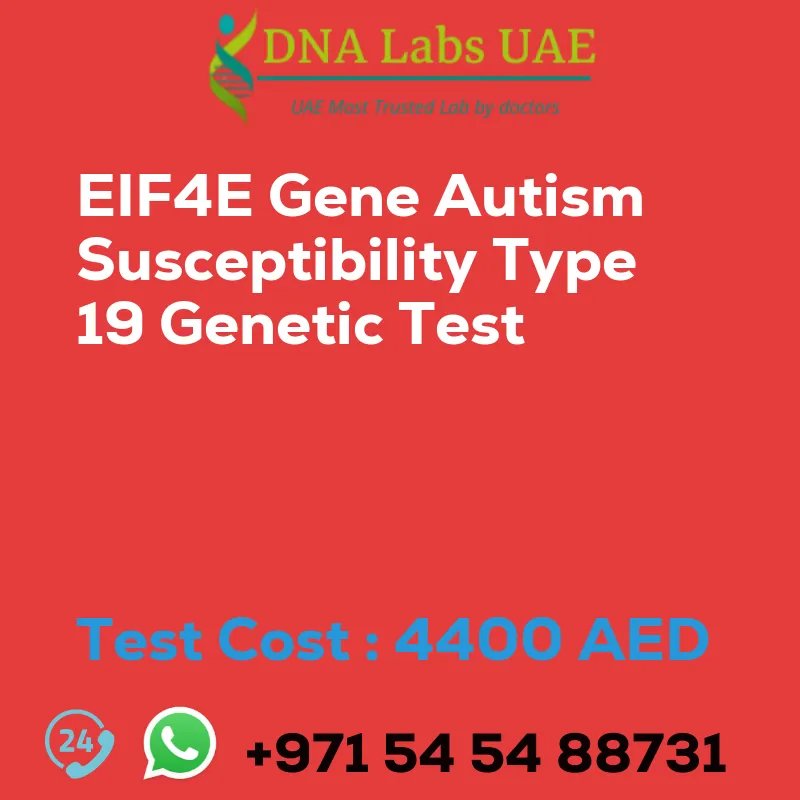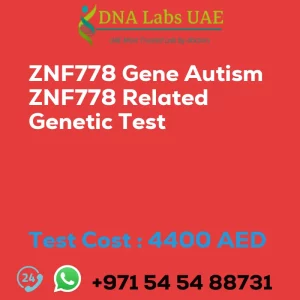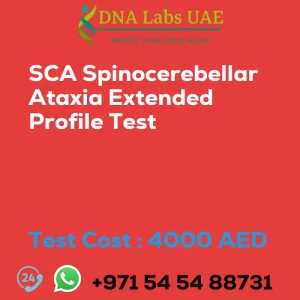EIF4E Gene Autism Susceptibility Type 19 Genetic Test
At DNA Labs UAE, we offer the EIF4E Gene Autism Susceptibility Type 19 Genetic Test for individuals who want to assess their genetic risk factors for autism spectrum disorder (ASD). This test is specifically designed to detect variants in the EIF4E gene and other genes associated with ASD.
Components
- Price: 4400.0 AED
Sample Condition
The sample required for this test can be either blood, extracted DNA, or one drop of blood on an FTA card.
Report Delivery
The report will be delivered within 3 to 4 weeks after the sample is received.
Method
We use NGS (next-generation sequencing) technology for this genetic test.
Test Type
This test specifically focuses on neurological disorders, including autism spectrum disorder.
Doctor
Our neurologist will be overseeing the EIF4E Gene Autism Susceptibility Type 19 Genetic Test.
Test Department
This test falls under the genetics department at DNA Labs UAE.
Pre Test Information
Prior to undergoing the EIF4E Gene Autism Susceptibility Type 19 Genetic Test, it is important to provide the clinical history of the patient. Additionally, a genetic counseling session will be conducted to draw a pedigree chart of family members affected by EIF4E Gene Autism Susceptibility Type 19.
Test Details
The EIF4E gene is located on chromosome 4q23 and encodes the eukaryotic translation initiation factor 4E (eIF4E). This protein plays a crucial role in the initiation of protein synthesis, which is essential for proper cellular function.
Studies have suggested that variants in the EIF4E gene may be associated with an increased risk of autism spectrum disorder (ASD). Specifically, a single nucleotide polymorphism (SNP) in the EIF4E gene, known as rs17586664, has been linked to ASD susceptibility in several populations.
NGS genetic testing is used to detect variants in the EIF4E gene and other genes associated with ASD. This type of testing allows for the simultaneous analysis of multiple genes, providing a more comprehensive assessment of genetic risk factors for ASD.
It is important to note that while the exact role of the EIF4E gene in ASD is still being investigated, genetic testing for variants in this gene may be useful for individuals with a family history of ASD or other developmental disorders. However, it is important to understand that genetic testing alone cannot diagnose ASD and should be used in conjunction with other diagnostic tools and clinical assessments.
| Test Name | EIF4E Gene Autism susceptibility type 19 Genetic Test |
|---|---|
| Components | |
| Price | 4400.0 AED |
| Sample Condition | Blood or Extracted DNA or One drop Blood on FTA Card o |
| Report Delivery | 3 to 4 Weeks |
| Method | NGS Technology |
| Test type | Neurological Disorders |
| Doctor | Neurologist |
| Test Department: | Genetics |
| Pre Test Information | Clinical History of Patient who is going for EIF4E Gene Autism susceptibility, type 19 NGS Genetic DNA Test A Genetic Counselling session to draw a pedigree chart of family members affected with EIF4E Gene Autism susceptibility, type 19 |
| Test Details |
The EIF4E gene is located on chromosome 4q23 and encodes the eukaryotic translation initiation factor 4E (eIF4E). This protein plays a crucial role in the initiation of protein synthesis, which is essential for proper cellular function. Several studies have suggested that variants in the EIF4E gene may be associated with an increased risk of autism spectrum disorder (ASD). In particular, a single nucleotide polymorphism (SNP) in the EIF4E gene, known as rs17586664, has been linked to ASD susceptibility in several populations. NGS (next-generation sequencing) genetic testing can be used to detect variants in the EIF4E gene and other genes associated with ASD. This type of testing allows for the simultaneous analysis of multiple genes, providing a more comprehensive assessment of genetic risk factors for ASD. Overall, while the exact role of the EIF4E gene in ASD is still being investigated, genetic testing for variants in this gene may be useful for individuals with a family history of ASD or other developmental disorders. It is important to note, however, that genetic testing alone cannot diagnose ASD and should be used in conjunction with other diagnostic tools and clinical assessments. |








